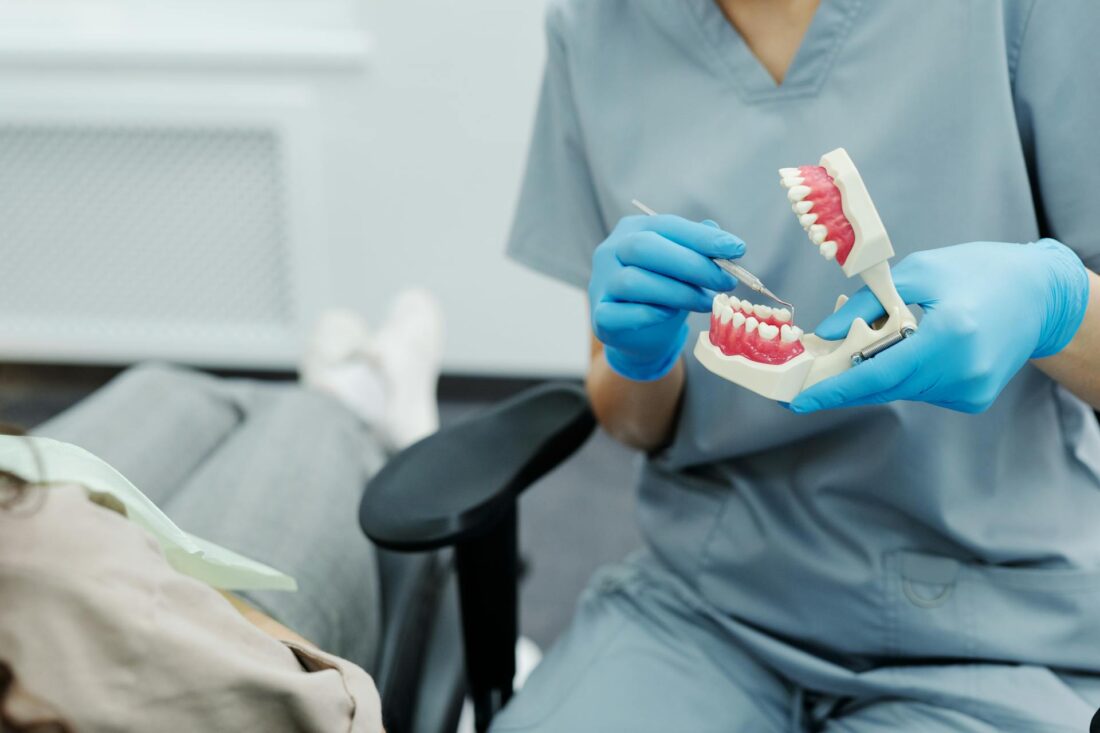Gum disease affects the gum tissue and can cause long-term harm including bone loss and tooth loss. In Singapore, advanced gum disease treatment is offered to enable people to regain their oral health and stop more problems. Gum disease can be under control with correct care and early intervention.

Understanding Gum Disease and Its Stages
When destructive bacteria in the mouth build up as dental plaque along the gum line, gum disease results from infections and inflammation. Untreated gum disease moves through two primary phases:
Gingivitis (Early Stage)
- Early on in gum disease, gingivitis is typified by red, puffy, bleeding gums. Gingivitis can be reversed with good dental cleanings and consistent oral hygiene.
Periodontitis (Advanced Stage)
- As the infection advances further into the gum tissue, periodontitis results from damage of the soft tissue and bones supporting the teeth. Untreated periodontitis can lead to gum recession and tooth loss.
Common Symptoms of Gum Disease
Timeliness of treatments depends on early recognition of gum disease symptoms. Typical indicators are:
- Puffy or red gums
- Bad breath resulting from gum diseases
- Bleeding gum during flossing or brushing
- Gum recession highlighting the tooth root
- Either moving teeth or loose teeth
- Development of deep spaces separating the teeth from the gums
Risk Factors for Gum Disease
Several factors can increase the risk of developing gum disease, including:
- Poor oral hygiene: Bad dental hygiene results from insufficient brushing and flossing building plaque at the gum line.
- Smoking: Periodontal disease risk is much increased by tobacco usage.
- Genetics: Genetically certain people are more likely to get gum disease.
- Health conditions: Gum disease is more likely in people with diabetes among other diseases.
- Dry mouth: Gum disease can be caused in part by several drugs or disorders that lower saliva output.
Gum Disease Treatment Options in Singapore
Depending on the degree and stage of the gum disease, Singapore provides a spectrum of therapies for it. These procedures seek to stop the disease from getting worse and bring periodontal health back.
Nonsurgical Treatments
Early stages of gum disease patients are advised nonsurgical therapies most of the times:
- Scaling and Root Planing: This deep-cleaning process called scaling and root planing smooths the tooth roots to enable gums to reattach to the teeth and removes plaque and tartar from below the gum line.
- Antibiotic Therapy: Medications such oral antibiotics, gels, or mouth rinses may be administered to lower gum infections and bacterial growth.
Surgical Treatments for Advanced Gum Disease
In more advanced gum disease situations, surgical therapies could be required:
- Pocket Reduction Surgery: Often referred to as flap surgery, pocket reduction surgery lowers the depth of pockets between teeth and gums therefore facilitating the removal of germs and prevention of future infections.
- Tissue Regeneration: Under this procedure, lost bone and gum tissue is encouraged to regenerate via membranes or grafts.
- Soft Tissue Grafts: Patients with extreme gum recession could require soft tissue grafts to cover exposed roots and rebuild the gum line.
Preventing Gum Disease with Proper Oral Hygiene
Stopping gum disease calls for regular, thorough dental cleaning habits. Use these pro-active measures to reduce your risk:
- To get dental plaque off, brush twice a day with fluoride toothpaste.
- Daily floss to clear gum line and between teeth of plaque.
- Reducing plaque and killing dangerous germs can be accomplished with antibacterial mouthwash.
- See a dental hygienist for planned frequent teeth cleanings to keep your gum condition under control.
- Avoid tobacco products, which contribute significantly to gum disease.
Gum Disease and Your Overall Health
Studies by organisations like the American Academy of Periodontology and the Mayo Clinic have revealed that untreated gum disease can impact more than just your mouth. It has been connected to illnesses including diabetes, heart disease, and respiratory infections. Early and strong therapy is especially important as the germs causing gum disease can enter your bloodstream and aggravate general inflammation.
Conclusion
Expert gum disease treatments abound in Singapore to help you regain dental health and stop more issues. From scaling and root planing to surgical treatments including pocket reduction surgery and tissue regeneration, prompt intervention is essential to prevent the major consequences of periodontal disease. Regular dental visits and good oral hygiene help you to maintain healthy gums and avoid gum disease from compromising your general condition.



